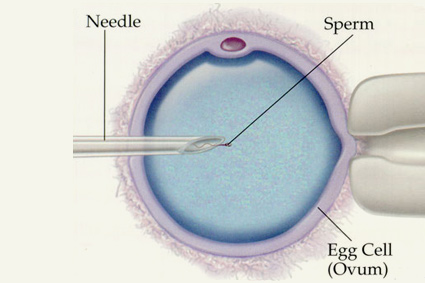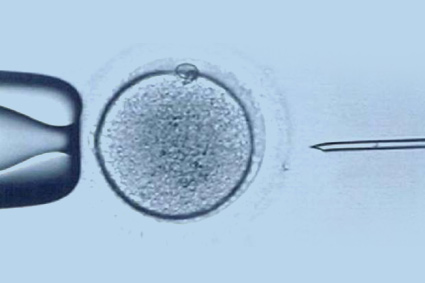ICSI (Intracytoplasmic Sperm Injection)

Intracytoplasmic sperm injection (ICSI) is a new procedure that allows couples with sperm problems to have IVF treatment. Developed in Belgium in 1992, ICSI is the process of injecting a single sperm into an egg.
It is a remarkable procedure since it allows men with only very few sperm to have a chance of having their own children.
What is the normal process of fertilization during an IVF cycle ?
The eggs that are collected from your ovaries are kept in special incubators in the IVF laboratory. Your semen sample is processed to recover the strongest and best swimming to be used to inseminate the eggs. Poorly swimming and dead sperms are discarded as medical waste. Because the egg has a thick shell and is surrounded by thousands of follicle cells, the Embryologist will usually add about 100,000 sperms to each egg. Adding so many good sperms to each egg disperses the follicle & ensures that one sperm will get into & fertilize the egg.
Will my sperms be able to fertilize eggs ?
All couples having IVF treatment will have their semen sample analyzed by the laboratory staff. As well as checking the basic parameters of the sperm sample, such as count and motility, the laboratory will examine how well the sperms are swimming and whether or not the sperms are physically normal. It is important that the sperms are strong swimmers to be able to reach and penetrate the egg.
In general, men with "normal" semen samples have nothing to worry about and do not need ICSI. However, if we think that you need ICSI we will talk to you after we examine your semen sample. Any man who has consistently poor sperms, and men that need to have their sperms recovered surgically will always need ICSI.
What does ICSI involve ?

If a decision has been made by you and your Physician to have ICSI, the laboratory will get specific instructions on how many eggs to inject. Sometimes, couples with borderline sperm samples will decide to have some eggs injected and some inseminated normally.
Suction applied by a glass holding pipette keeps the egg from moving during the injection. A single sperm is picked up in a tiny microneedle. The needle has a sharp tip and can be gently pushed through the shell of the egg and into the cytoplasm. The sperm is deposited deep inside the egg and the empty needle is withdrawn.Is ICSI a safe procedure ?
ICSI is different from conventional insemination since we clean away the follicle cells from around the eggs and an Embryologist chooses the sperm to be injected. A small number of eggs do not tolerate the injection procedure and you can expect that about 5% of eggs die as a direct result of ICSI. However, fertilization rates, embryo quality and pregnancy rates are the same as for couples who do not have ICSI.
It is important for you to be aware that ICSI may have some risks for resulting children also. Studies published in scientific journals have shown that children resulting from ICSI are more likely than other children to have a genetic abnormality. The risk of such an abnormality is usually 2 children per 1000 births for natural pregnancies, but with ICSI the risk is 8 children per 1000 births. The problems seen in the affected children can be very serious (e.g. heart defects). So your Physician will talk to you in detail about your risks before committing to the ICSI procedure.
Who can I talk to if I have further questions ?
If you think that you might need ICSI during your IVF cycle, your Physician will explain the procedure and the risks. The medical staff at center is familiar with the scientific literature and can give you the latest information. We encourage you to ask questions and you can speak to a member of our staff at any time.